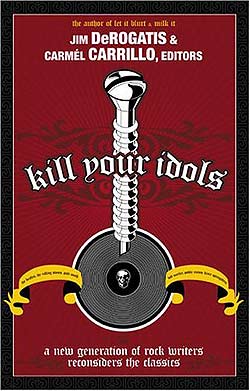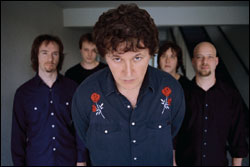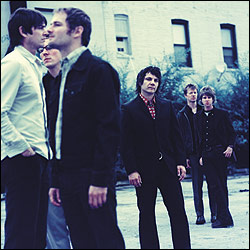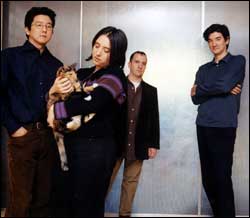From the pretentiously unpretentious ramalama in Jim DeRogatis’ introduction about staying true to the most received ideas in rock criticism by smashing groupthink and overcoming nostalgia, to contributor Allison Augustyn railing against solipsism by declaring, “Rock ‘n’ roll is about making noise, not making friends,” the new collection Kill Your Idols (Barricade, $16), edited by DeRogatis and Carmél Carrillo, is the worst rock book since Joe S. Harrington’s vapid, endless Sonic Cool. Presented as an attack on the bogus consensus of the greatest-albums-ever lists you see in Rolling Stone and on VH1, Idols features 35 writers wrinkling their noses over nearly as many “classic” albums.
DeRogatis wastes no time putting theory into practice by making wisecracks about the Doors and Sgt. Pepper’s so obvious even Jann Wenner probably makes them by now. He even makes a few that were never obvious to anyone at all because they’re completely fucking retarded, like when implying the “made her look a little like a milit’ry man” line in the Beatles’ “Lovely Rita” makes the song’s title character a transvestite and potential rapist.
The other contributors sink to the occasion. Most of them seem to recognize on some level that the albums they chose to write about live in a personal nowhere situated between “It’s kinda dull” and “There’s a few good songs but . . . ” and consequently bore themselves into glibness. Rock fans have been arguing about rebellion, race, sex, real vs. fake, et al., for years, but most of the Idols crew just settle things with a baldness that’s frequently stupefying. Some quotes: “Rock ‘n’ roll is changing, though. It’s no longer the rebellious expression of youth.” “Elvis, like our bodies, is temporal, arguably even disposable.” “Sensitive white people will never genuinely understand the suffering of poor repressed minorities, because by and large, life isn’t that tough for them.”
A few writers realize you can’t turn that shrug into a karate chop (for real) and make bold efforts to resist the subsequent entropy. The most ambitiously awful essayists either subject albums to a death-by-a- thousand-nitpicks that misses both forest and trees; aim their most heartfelt air swats at the straw men who made crappy music unavoidable and consequently ruined everything, everything (boomers, liberals, Xers, MTV, other critics, their younger, dumber selves, various phonies); or come up with some serious bullshit, like Jim Walsh’s totally punk Fleetwood Mac assassination fantasy, Adrian Brijbassi’s poignant memories of high-school stain problems, and Jeff Nordstedt’s suggestion that maybe Brian Wilson should’ve fucked goats to be more like David Lee Roth or something. Intuiting that the only winning move is not to play, Carrillo succeeds by avoiding canons, goat fucking, and straw men entirely, writing instead about the favorite songs of her tasteless idiot ex-boyfriends with a focused rage that’s beyond anyone else’s.
DeRogatis is correct when he says that rock canons can suck because they fail to suggest that rock and roll is deeper, thicker, and stranger than a top-100 list might imply. But Idols features close to no commitment to another window with a nicer view. The authors’ stances are still framed by the music applauded by others ages ago: The contributors’ own top 10s largely stay within the realm of rock-crit orthodoxy, and most of them, DeRogatis included, take aim at their targets by unfavorably comparing them to other canonical albums. In spite of his intentions, for DeRogatis the rock and roll canon is a closed system, and in his attempts to escape it, the more he struggles, the more he strangles.
Kill Your Idols contributors Tom Phalen, Steve Solder, and Keith Moerer read from and discuss the book at Elliott Bay Book Co., 101 South Main St., 206-624-6600, at 7:30 p.m. Wed., Aug. 11. Free.








